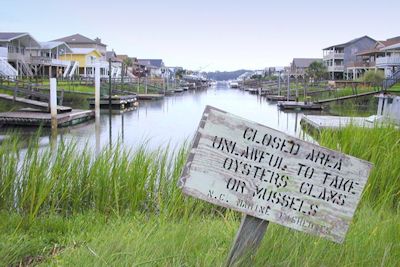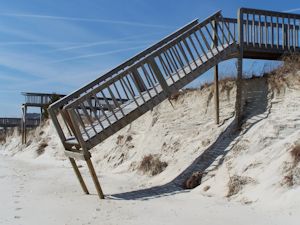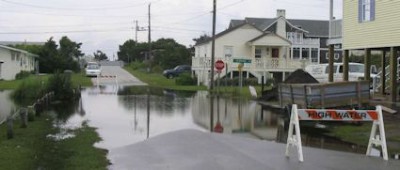RALEIGH — A study of plans to revert to previous, weaker stormwater rules, a long-range look at water resources in the Cape Fear region and a major study of beach erosion are among the dozens of coastal-related reports due ahead of the 2016 legislative session in April.
Most of the studies were proscribed in the state budget or in several regulatory bills passed during the lengthy 2015 session of the N.C. General Assembly. The studies are on a fast track this year because the legislature will convene a month earlier – in April. The quicker start was needed after North Carolina moved its election primaries from May to March. That’s accelerated the schedules for committees slated to review studies.
Supporter Spotlight
Next week, the legislature’s Environmental Review Commission, or ERC, the designated recipient of several key policy studies, and the Joint Legislative Oversight Committee on Agriculture and Natural Resources hold their first pre-session meetings.
Officials with the N.C. Department of Environmental Quality, or DEQ, say despite the number of studies and faster schedule, the department should meet its deadlines.
“The coordination process is well underway so that we can meet our deadlines,” Stephanie Hawco, a spokeswoman for the department said in an email. “In the event that a deadline can’t be met, legislative affairs will work with General Assembly staff to determine when a complete study can be submitted.”
Stormwater Study

Studies that either review existing coastal rules and policies or advance previously passed legislative mandates were a major focus of the 2015 session. They range from in-depth studies of oyster strategies to the effects of removing a dike near Southport.
Todd Miller, executive director of the N.C. Coastal Federation, said one of the most important pending studies reviews a potential move by the legislature to revert to previous coastal stormwater standards that state environmental regulators recognized as failing to protect shellfish waters. “Basically, we found that what we had in place was a failure,” Miller said.
Supporter Spotlight
The state tightened the standard for shellfish waters in 2008 by requiring that runoff be treated if the hard, constructed surfaces exceed 12 percent of the building site. There was an attempt during the session last year to roll back the threshold to old standard of 25 percent.
The new study is the result of a deal struck during last year’s session after legislative proponents of the rollback, led by Sen. Harry Brown, R-Onslow, and Rep. Pat McElraft, R-Carteret, agreed to allow DEQ to determine the proper impervious surface limits and accompanying buffer standards. The study requires a comprehensive look at the relationship of built-upon areas and vegetative buffers.
The report is due to the ERC by April 1.
Miller said there are some changes to the stormwater rules that might make sense, but he was disappointed to see the state move backwards. “We’re still losing ground when it comes to water quality,” he said.
Other Studies

Grady McCallie, policy director with the N.C. Conservation Network, said there are several key studies that could shape policy this session and in the years ahead.
One big change could come if the state adopts exemption from environmental regulations for utility lines. McCallie said that plan, which was proposed in an early version of the regulatory reform legislation, would allow electricity transmission lines, gas lines and other infrastructure to proceed without nearly as much public input.
There may be some areas where modifications make sense, he said, “but it’s a bad idea to flat out exempt them.”
Another study that could have a big impact, McCallie said, is a review of standards for heavy metals associated with coal ash contamination. There are also studies on extending water and solid waste permits and one on new rules on air quality permits that allow polluters to operate under the least stringent permits in the event of challenges.
Here’s a rundown of the major legislative studies on environmental issues:
Beach erosion: The N.C. Division of Coastal Management is required to “study and develop a proposed strategy for preventing, mitigating and remediating the effects of beach erosion,” including efforts by other states and counties to “prevent beach erosion and ocean overwash and to re-nourish and sustain beaches and coastlines.”
The report is to be sent by Feb. 15 to the ERC and Senate and House appropriations committees.

Cape Fear Basin resources: The ERC and DEQ are required to produce a study of the availability of water resources in the Cape Fear River Basin within Brunswick, New Hanover and Pender counties, addressing the increased demands on groundwater and limited surface water options in that area.
An interim report may be submitted this year with a final report, including any legislative proposals for the 2017 session.
Flood elevations and building heights — The N.C. Department of Insurance, the Department of Public Safety and the Building Code Council are to jointly study how flood elevations and building heights for structures are established and measured along the coast.
The report is due March 1, along with any legislative recommendations.
More department transfers: In the next step in the reorganization of both DEQ and the newly-created state Department of Natural and Cultural Resources, both departments are required to report on the potential transfer to cultural and natural resources, the Albemarle‑Pamlico National Estuary Partnership, the Coastal Reserves Program, the Office of Land and Water Stewardship, all or a portion of the Office of Environmental Education and Public Affairs, the Division of Marine Fisheries and the Wildlife Resources Commission. They are all now part of DEQ.
The study is due April 1 to chairs of House and Senate appropriations committees.

New Inlet Dam: DEQ is required to report on a plan to remove the New Inlet Dam, also known as “The Rocks” near Southport. A legislative finding last year called for working with the Army Corps of Engineer and the National Parks Service on a removal plan. The report, due April 1 to the House and Senate appropriation committees and the ERC, is a requirement before the project can move forward.
Oyster studies: The Division of Marine Fisheries is to report on the policy recommendations and statutory changes needed to support and encourage the ecological restoration and economic stability of the shellfish aquaculture industry. The report has several key areas of focus including a look at funding sources, restoration strategies and measures to combat oyster disease and harvesting practices. The report is due to the ERC and other legislative environmental and agriculture committees by March 1.
Permits in contested cases: In the 2015 session, the legislature modified procedures on third-party challenges to air quality permits allowing projects to move forward while a permit is contested. DEQ is to study whether the amendments should be expanded to other programs including water and solid waste permitting. The study is due by March 1 to the ERC.
Wetlands mitigations: DEQ is required to report to the ERC by March 1 on proposal to petition the Army Corps of Engineers to allow public and private development projects that destroy federally protected wetlands to make up for those losses outside the watersheds where development will occur. The report is due March 1 to the ERC and to Senate and House appropriations committees.
Riparian buffers: The state Environmental Management Commission will study ways “to provide regulatory relief from the effects of riparian buffer rules.” The study is due April 1 to the ERC.







